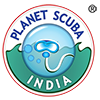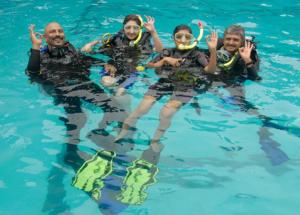Scuba diving has always been associated with deep blue seas, glorious coral reefs, breathtaking underwater sceneries and psychologically, a momentary escape from the drudgeries of life above water. Not everyone can don the wet suit and take a dive in the open waters for the first time, though. It takes a lot of practice to be able to do this, apart from the required certifications. Perhaps the best way to start training for the big dive is inside a swimming pool, where the environment is controlled and there are no surprises for the novice divers.
PADI (Professional Association of Diving Instructors) strongly recommends dive schools around the world to train students in contained waters before taking them out to open waters. One of the main reasons for this would be to combat the initial hesitation and apprehension of students about to dive for the very first time. Apart from the fact that training in a swimming pool is safer it is also easier for instructors to maintain control over the students’ equipment as well as their own.
There is also the psychological aspect of diving to consider. People’s paranoia about sharks and other undersea creatures, fueled by Hollywood, does play an important role in the speed at which a student learns the nuances of breathing and staying calm underwater.
Controlling the rate of descent and staying stable at the desired depth are two other important aspects that can be addressed in contained water dives. There are no extraneous waves and sudden currents that would affect the balance of the diver, and this makes life that much easier for the instructor in training the student.
“It’s all a matter of what’s best for the students,” says Mr. Madhava Reddy, director of Planet Scuba India, which recently launched the country’s first inland scuba divind school in Bangalore. “Our PADI 5-star swim center complimented by the dive center at the KC Reddy Swim Centre and the expertise of out trainers makes our diving school one of the safest. Contained water dives are the best way and of course, the safest way for someone to learn diving and to build the required confidence to dive in open waters,” he added.
Safeguarding The Marine Ecosystem The Planet Scuba Way
 “The sea is everything… It is an immense desert where man is never alone for he feels life, quivering around him on every side.”
“The sea is everything… It is an immense desert where man is never alone for he feels life, quivering around him on every side.”
— JULES VERNE
20,000 Leagues Under The Sea
Marine ecosystems cover approximately 71% of the Earth’s surface and contain approximately 97% of the planet’s water.
Why is aquatic ecosystem health important to humans? Because everything is connected, where an ecosystem is out of balance eventually humans will begin to suffer as well. Our health and many of our activities are dependent on the health of aquatic ecosystems. Most of the water that we drink is taken from lakes or rivers. If the lake or river system is unhealthy, the water may be unsafe to drink or unsuitable for industry, agriculture, or recreation – even after treatment.
The proliferation of non-native species has created problems. One recent example is the rapidly expanding zebra mussel population. Zebra mussels have few natural predators, and because the female can produce 30000 eggs yearly, they are expected to spread throughout most of the freshwater systems. This mussel species is already clogging industrial and municipal water treatment intake pipes, coating boats and piers, and causing beach closures.
Because we share the world with many other species of plants and animals, we must consider the consequences of our actions. Over the past several decades, increasing human activity has rapidly destroyed or polluted many ecological habitats throughout the world. It is important to preserve all types of biomes as each houses many unique forms of life. However, the continued heavy exploitation of certain biomes, such as the forest, freshwater, and marine, may have more severe implications.
We at Planet Scuba recognize the threats to the marine ecosystem and realize that awareness about these threats is minimal in India. Through our diving courses, we hope to make the whole experience fun and educative, and ensure that people can appreciate the natural beauty in abundance in our oceans and follow appropriate measures to safeguard them.

